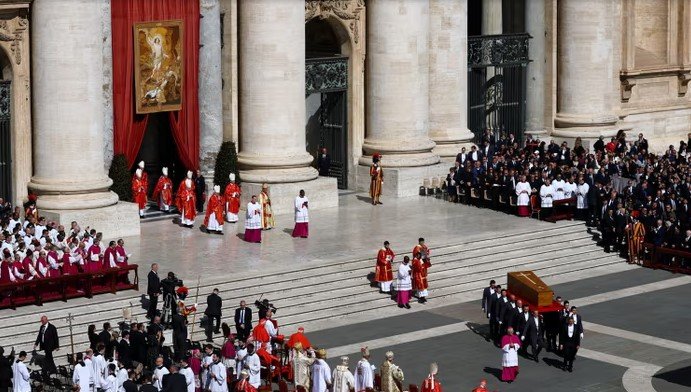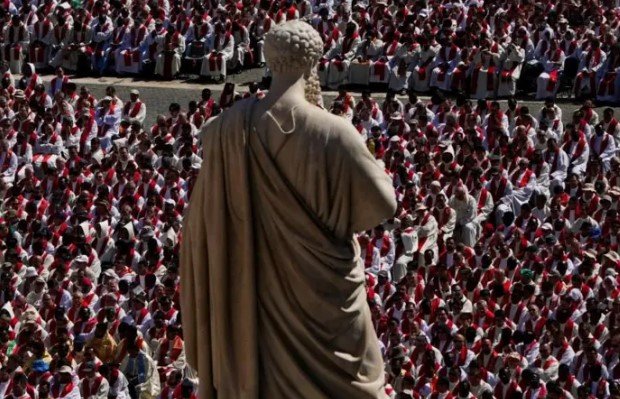Global Dignitaries Pay Their Final Respects to the Transformational Pontiff}
Rome, Italy – In a singular, unprecedented gathering, thousands of mourners, including heads of state, royal families, clergy, and common folk, flocked to Vatican City to mourn the loss of Pope Francis, one of the most influential and progressive pontiffs of modern history. The deeply moving cerebration was held in St. Peter’s Square, where multitudes paid their respects through prayer, song, and other forms of memorial to mark the departure of a spiritual leader who altered the meaning of papacy.
Despite being predictable due to worsening health in recent months, the news of ُPope Francis’ demise still managed to send shockwaves around the world. The 88-year-old Eld with the second oldest Argentinian born pope, Jorge Mario Bergoglio, passed away peacefully in Vatican’s Mater Ecclesiae Monastery, where he had recently chosen to live in sober contemplation after a lifetime of global advocacy and reform.”
This is the first instance within modern history where a sitting or recently retired pope was granted a full ceremonial funeral with such widespread attendance from sitting heads of state, representatives from international organizations, and royalty spanning the globe. The outpouring of affection, veneration, and respect demonstrated how much Pope Francis impacted not just the Catholic Church but also important issues regarding humanity, including global poverty, climate change, human rights violations, and interfaith relations.

A Grand Farewell in the Heart of Catholicism
The funeral Mass was celebrated by Vatican Secretary of State Cardinal Pietro Parolin, who served under Francis for most of his papacy. The decision was meaningful, given that Pope Francis has expressed a desire for simpler ceremonies, especially those that convey messages of humility and a senior’s selfless service to society. Regardless, the attendance was epic with more than a hundred thousand people present in St Peter’s Square and millions more from all over the globe watching live on various broadcasting networks.
Pope Francis spent sleepless nights analyzing dangerous power dynamics while attempting to implement tragic foreign policies, the very same day world politics gifted them. It was one of the rare occasions where the Pope, devoid of his infamous haunting grin, looked fragile and exhausted, possessing neither insightful wit nor pieces of papal wisdom to be laid bare to the world.
Glistening Sun & Silent Bells
Emily Cartwright from the United States, alongside Macron, Meyer, and even Luiz Oliveira from Brazil, stepped into a rare moment of unfiltered unity, shattered by polite trophy smiles. Naruhito made the trip to Italy alongside Arjun Desai, who was also attending the magnificent despair, while the British delegation was led by still fictionalized Charles III and his entourage. Shocking enough, religious representatives from Islam, Judaism, Buddhism, and Eastern Orthodox Christianity showed up too, further underlining the legacy of Francis.
During his eulogy, President Cartwright said, “Pope Francis reminded us that compassion, courage, and kindness are not bound by borders or beliefs. He was a spiritual leader, yes—but also a global conscience who stood with the poor, embraced the outcast, and led us toward understanding.”
Dutch Queen Maxima, who came alongside King Willem-Alexander, noted, “His Holiness was a friend to those whose voices were unheard. He brought warmth and clarity in a time often clouded by division.”
Pope Francis: His Legacy
Beginning his papacy in 2013, Pope Francis has made remarkable social reforms while tirelessly working toward social justice initiatives. His actions have set him apart as the first pope from America, the first Jesuit pope, and a pope who works to eliminate societal discrimination. Francis supported the multitude of refugees fleeing persecution, voiced the escalating concern surrounding climate change, and continuously lectured the world on its ever-growing consumerism and spiritual negligence.
He became an unyielding champion of communication between religions, ages, and beliefs. His papal letters, such as Laudato Si’ concerning the care of creation and Fratelli Tutti on global brotherhood, are regarded as contemporary theological milestones. Even in the face of Traditionalist criticism within the Church, he resolutely supported inclusivity, love, and mercy.
“He thought the Church ought to be a field hospital for the wounded.” Cardinal Luis Tagle, one of the church leaders closest to Francis, explained, “And that’s what he made it. A place of healing, humility, and hope.”
Grieving and Commemorating Around the World
While the memorial service progressed, countless others participated in church and cathedral services from Buenos Aires to Manila, from Nairobi to Dublin, simultaneously. Tributes were held, the candles were lit, and prayers were done in diverse tongues. In Argentina, a public mourning day was declared, with many participants silently walking towards Plaza de Mayo, holding signs stating, “Gracias, Papa Francisco.”
In Rome, however, the Vatican proclaimed that the burial would take place in the crypt of St. Peter’s Basilica, under where he had wished to be buried, the chamber formally of Pope John Paul II decorated him so his splendor was relished boundlessly, till in 2011 his bones were moved to the open. Francis did ‘demand’ a ‘simple slab’ as a final resting place and additionally wished there would be no grandiose tribute statues paid to him.
A Papacy That Changed the World
Perhaps the most remarkable memory that stays cognizant and vivid is of Pope Francis’ struggles internally, including overcoming sexual abuse scandals and the church’s waning appeal in the West. He, however, opened commendable new dialogues and inspired change throughout. The relatable nuances of his persona, like refraining from residing in the Apostolic Palace and rather choosing to live in a modest guesthouse, were coupled with his emphasis on lay pastoral care overshadowing ecclesiastical doctrine.
Pope Francis, even in his last days, made sure to highlight the subject of hope. A week before his passing, Pope Francis’ last public statement would come in the form of a handwritten note stating, “The world can be cold, but we are not made of stone. Love one another without condition, and you will find God in each other.”
Table of Contents
A Moment of Unity
Among the attendees, a moment of rare undivided global unity was felt when the last prayers were recited and the casket was lowered into its final resting place. The tears of pilgrims could be seen while the Presidents bowed their heads and the Religious leaders held hands. For a few eternally sacred moments, the remembrance shared overshadowed the differences that have drawn the world apart for years.
And so ended the funeral of Pope Francis—humble in scope, yet grand in spirit. The absence of his physical presence is not one to be mourned, for the legacy of his wisdom will be one that shapes generations to come.



